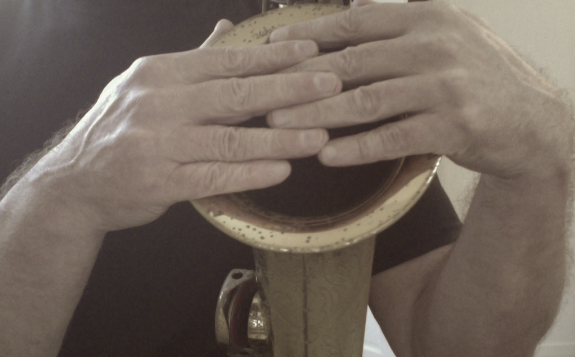One of the aims (and benefits) of studying the Alexander Technique is an improved sense of awareness. Without exception, my students gain measurable improvements, not only in their kinesthetic (body) awareness, but also, in their overall awareness through their other senses, as they play music. They learn to hear more vividly, perceive time more accurately, and notice subtleties in themselves (and the music) more readily.
Yet, most of the musicians I teach already come to me with a more acute awareness of their bodies than the average person. It is not difficult at all to get musicians to notice what they’re doing with themselves as they play. Here’s a typical exchange between me and one of my students in a first lesson:
“What do you notice about your shoulders as you bring your hands to your instrument?”
“I lift them up.”
“What do you notice about your head and neck when you to that?”
“I kind of scrunch my head down into my shoulders.”
“Can you see how that could have a negative impact on your playing? Maybe interfering with the freedom in your arms and hands?”
“Yes, now that you mention it. Sure.”
In contrast, when I give a first Alexander Technique lesson to the average person who doesn’t play music, it is usually not quite like the above exchange. We may be working on a simple activity, like rising from a chair, or beginning to speak. As I ask the same questions about the head, neck and shoulders, it is most typical for my student to draw a blank. (My job starts here by helping them become aware.)
But as I continue to ask my musician students in their first lesson about noticing things as they play, it becomes clear that it is not their inability to do so that’s causing the problem (prompting them to seek me for help in the first place).
So what is causing the problem?
In the simplest sense, it’s not a lack of awareness, but a misinterpretation of bodily sensation. You see, it’s not that most musicians have difficulty noticing these things (once they’re pointed out), it just that they often don’t perceive of these things as misdirected effort (the very thing that is causing their problems as they play!)
Instead they think of what they do is part and parcel of what it takes to play music. It’s a kind of “over-efforting” that not only feels right, but even seems necessary in order to play their instrument. Becoming aware of these tense gestures is the first step.
The next is to reinterpret them for what they actually are: unnecessary habits of misdirected tension. That’s not always an easy thing to do, as many musicians are quite attached to the physical sensations of playing their instrument. It’s not unusual for a musician to want to feel that they’re working hard (even though it’s creating difficulties). This sometimes becomes almost an addiction, an affirmation that they’re playing “well”.
And to make matters more complicated, my students will often have an almost religious reverence for certain points of pedagogy taught to them that they believe to be virtually indisputable (usually dispensed to them by another excellent musician/teacher).
My job is to connect the new experiences of playing without the excess effort, to my student’s reasoning, and (ever-increasing) knowledge. This is a matter of re-education: helping them to better understand the actual acoustical demands and principles of playing their instrument as it relates to the way their bodies can best accommodate these demands and principles.
I encourage my students to not believe what I say because I say it, but rather, because it can be tested and found to be true. I want them to know why they choose to do (or not do) something with themselves as they play. They need to own it. They gain this ownership through direct experience.
The next step in this process (once they’ve clarified their misconceptions about their bodies) is to learn how to play without going into their habit. This is where the real work (and real value!) of the Alexander Technique comes into play.
By design and necessity, this happens gradually. But the changes that take place can be absolutely remarkable.
Here’s the good news
Because you’re a musician, you already have the skill set to be able to notice many subtle (and not so subtle) things about yourself as you play. This is a HUGE advantage, and can really speed up your progress if you wish to change your habitual tension patterns. Whether you have problems with chronic pain, and/or coordination, being able to pay attention to yourself as you play gives you a definite leg up.
If you find a good, AmSAT certified Alexander Technique teacher, you can find how quickly you can learn to interpret what’s happening in your body in an accurate and more helpful way. You’ll learn that all that extra effort with your head, neck, back and shoulders, your locked knees, tense feet, noisy breathing and squinting brow don’t help you one bit when it comes to making music.
And of course, always feel free to contact me if y0u need help. I would be my honor and pleasure to do so!
Playing music can be much easier than you perhaps thought. Use your skills of awareness to help you discover how much easier it can actually be.
